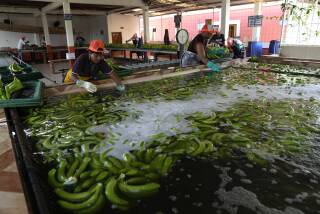Ecuador Seizes Oxy Operations
- Share via
Ecuadorean officials Tuesday seized oil projects run by Occidental Petroleum Corp., sending the company’s stock tumbling and dimming hopes of a trade deal between the South American nation and the United States.
The Occidental operations were transferred to Petroecuador, a state-run company, a day after the government revoked the U.S. oil company’s contracts in Ecuador. Standing on the steps of Occidental’s Quito offices, Petroecuador President Fernando Gonzalez declared that Occidental had violated laws and “must leave the country.”
He denied speculation that Ecuador planned to nationalize the country’s oil reserves, which at 4.6 billion barrels are the third-largest in South America. Still, a group that favors that path hailed the takeover as a “triumph for Ecuadoreans.”
Ecuador’s ouster of Occidental was the latest in a string of setbacks in the region for multinational oil companies. On Friday, Venezuelan President Hugo Chavez said his government would take larger ownership stakes in key oil projects run by Chevron Corp. and others. Two weeks ago, Bolivia nationalized its oil and natural gas industry.
“I think it’s a trend in the Andean region, reflecting a confluence of long-standing economic nationalism, populist politics and the current high prices for hydrocarbons,” said Peter De-Shazo, a Latin America expert at the Center for Strategic and International Studies.
Westwood-based Occidental, which has worked in Ecuador since 1985, denied breaking any contract terms but had nonetheless offered several proposals to settle a series of disputes with the government.
“It’s certainly disappointing,” Occidental spokesman Larry Meriage said. The company still hopes to salvage its Ecuadorean contract and restore relations there, but “as far as there being any type of resolution now ... it looks pretty dim,” Meriage acknowledged.
Wall Street took that view too. Occidental shares hit a low of $95.15 on Tuesday and closed the day at $96.97, down $2.18, or more than 2%. Ecuador represents a small part of Occidental’s oil reserves, but production there amounted to 7% of the company’s first-quarter output.
Jacques Rousseau, an analyst at Friedman, Billings, Ramsey & Co., responded by lowering his 2006 earnings estimate for Occidental by 30 cents to $10.40 a share.
The abrupt takeover also helped derail negotiations on a free-trade agreement between the United States and Ecuador. Neena Moorjani, a spokeswoman for the U.S. trade representative’s office, criticized the decision and said no new trade talks were scheduled.
Ecuador’s action “appears to constitute a seizure of assets of a U.S. company,” Moorjani said in a statement, adding that the administration would seek an immediate clarification of the situation, “including whether it intends to fully compensate the company as required under our bilateral investment treaty.”
Occidental’s Meriage said the company was reviewing its legal options and might seek international arbitration.
Philip K. Verleger Jr., senior fellow at the Institute for International Economics in Washington, said oil companies and their host countries periodically tussle over profits and operations. Since the early 1970s, U.S. oil companies have dealt with government take-backs in Saudi Arabia, Algeria, Kuwait, Peru and elsewhere, with varying degrees of compensation, he said.
“It’s not at all unusual,” Verleger said. “It’s precisely what you expect to happen when prices are high.”
Occidental took its biggest production hit in 1986, when U.S. economic sanctions against Libya forced the company to abandon its operations there. After restrictions were lifted in 2004, Occidental won new contracts in Libya and resumed work at its former fields.
The trouble in Ecuador began in 2002, when Occidental accused the government of “arbitrarily and discriminatorily” refusing to refund certain taxes and sought international arbitration. In July 2004, a panel said Ecuador owed Occidental $75 million. The Ecuadorean government subsequently launched an investigation of the company’s contract.
In the fall, Petroecuador urged the government to cancel its contract with Occidental, accusing the company of bypassing necessary approvals when it farmed out some production work in 2000. Occidental denied the allegation.
Occidental is Ecuador’s largest foreign oil producer, with 14% of the country’s output, U.S. figures show. The company employs 330 workers there, more than 90% of them Ecuadorean nationals, Meriage said.
The Associated Press was used in compiling this report.
More to Read
Sign up for Essential California
The most important California stories and recommendations in your inbox every morning.
You may occasionally receive promotional content from the Los Angeles Times.










